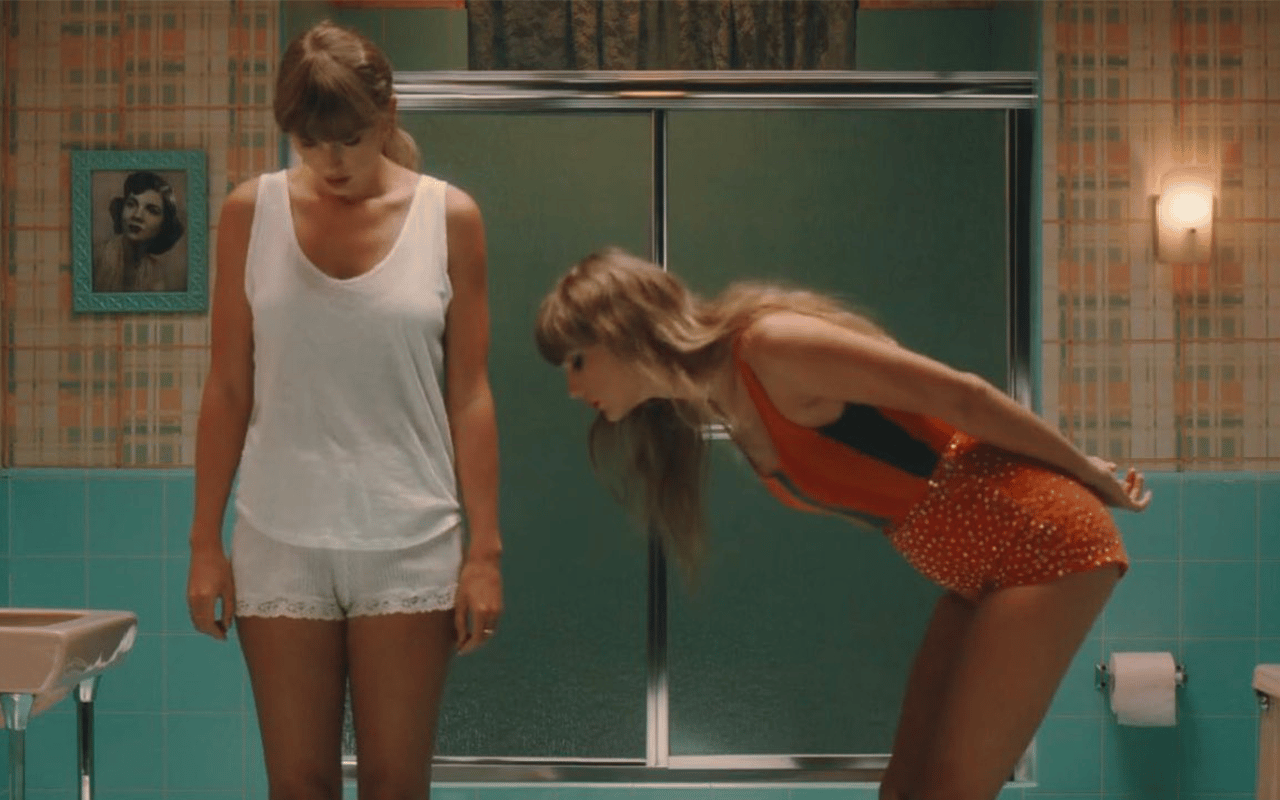
TW: This article discusses eating disorder content.
Taylor Swift has removed a scene from her music video for ‘Anti-Hero’ following backlash from body positivity activists over its fatphobic message.
The video, which Taylor described in a tweet as her “nightmare scenarios and intrusive thoughts play out in real time”, featured a scene of the singer stepping on a scale, with the word “fat” displayed in lieu of a number.
Now, it appears the music video has been edited, with both YouTube and Apple Music no longer showing the original version. Apple’s version now shows Taylor stepping onto a set of scales from a distance, with her ‘alter ego’ shaking her head at some now unseen results.
Taylor Swift faces accusations of fatphobia
Fans online found the scene insensitive, as the word “fat” seemed to be used to connote negative emotions in Taylor. Plus-size creators on social media explain that fatness is not something to be feared and that assigning value to fatness is inherently fatphobic.
“When you portray fat as a bad thing in a music video, even for a second, all of the young impressionable people who watch that video are going to internalise that the worst thing they can be is fat,” says TikTok creator @morethantracyt.
@melodywritessongs #stitch with @melodywritessongs The Anti-Hero scene was fatphobic because it is literally a depiction of Taylor Swift’s fear of fatness. Whether or not it was a justified use of that trope to comment on her ED is another discussion. But stop telling folks it’s not fatphobic when our whole society is systemically anti-fat. #antifatness #fatphobia #fatisbeautiful #plussizegirl #fatliberation #antihero #swifttok #fatphobiaisnotcute #fatactivist #bodyneutrality
♬ Anti-Hero – Taylor Swift
Twitter user Shira Rose, who claims to be an eating disorder therapist, reiterates this sentiment.
“Taylor Swift’s music video, where she looks down at the scale where it says ‘fat’ is a shitty way to describe her body image struggles. Fat people don’t need to have it reiterated yet again that it’s everyone’s worst nightmare to look like us,” she tweeted.
Taylor Swift’s music video, where she looks down at the scale where it says “fat,” is a shitty way to describe her body image struggles. Fat people don’t need to have it reiterated yet again that it’s everyone’s worst nightmare to look like us.
— Shira Rose (@theshirarose) October 21, 2022
In an op-ed for Teen Vogue, writer Catherine Mhloyi calls the scene “lazy” when compared to Taylor’s typical creative lens.
“Taylor is known for masterminding her career, for leaving no detail unchecked, no easter egg unhidden. The lack of creativity in the scale scene feels lazy by comparison — it’s nothing we haven’t seen in depictions of eating disorders in media for decades. In having the word “fat” appear on the scale, she made a choice to explicitly name her demon, the fear of being called fat, which is fatphobia in its most literal sense,” she writes.
Not everyone agrees that the imagery is fatphobic
Other creators have come to Taylor’s defense, noting that the musician has shared her struggles with disordered eating and dealing with insecurities related to her appearance in the public eye over the years.
TikTok creator @thegirlwithamicrophone, who is self-referred to as “fat,” is not bothered by the video as she feels Taylor was only trying to portray the mind of someone with an eating disorder, like herself.
“I don’t have a problem with her showing what her eating disorder sounds like to her, because it’s not her, it’s the disorder,” she says.
@thegirlwithamicrophone #stitch with @reynacohan #fyp #taylorswift #midnights #fatphobia
♬ Anti-Hero – Taylor Swift
Clemence Michallon for The Independent argues that the scene is a personal reflection of Taylor’s inner struggle with her body image and thus not inherently fatphobic.
“Anti-fat bias harms people in a myriad of ways (including in potentially life-changing settings, such as in healthcare). But what Swift is doing in the video for ‘Anti-Hero’ is quite obviously not an example of fatphobia. It is an expression of something that is both painful and personal to her, and relatable to millions of people around the world,” she writes.
Others believe that the scale represents society calling her “fat” as a negative label while her ‘alter-ego’ represents her intrusive thoughts validating this label.
Regardless of the argument at hand, it seems enough people were hurt by the music video to warrant changing it.
As noted by TikTok creator @thatirishdietician, “Maybe Taylor Swift and her entire PR team didn’t know about this. But impact matters more than intent. So if Swift really cared and she wasn’t a d*ck, she would listen to the fat community and just change her video.”
This scenario is the latest example of an artist making changes to a song or music video in response to backlash from fans. Both Lizzo and Beyoncé have recently apologised and removed lyrics from their songs after they were criticised for being ableist.
@thelizzostan for those of u who don’t know she’s talking about when she changed the lyrics to her song “grrrls” #lizzo #yitty #fyp #foryou #music #grrrls #rap #rnb #lizzobeeating #lizzbians #beauty #blackgirlmagic #icon #cuziloveyou #truthhurts #juice #aboutdamntime #special #2beloved #interview #backlash #edit #videoedit #edit #captions
♬ original sound – mi’chaella <3
These revisions symbolise the change Gen Z is already making in the world. What used to be a very obvious power imbalance between artists and fans is now evolving into an accountable relationship that resembles more of a two-way street.
As social media users continue to hold public figures accountable, it will be interesting to see if artists can learn from these experiences while remaining thoughtful about the impact of their art.
If you or someone you know has been impacted by disordered eating, contact the Butterfly Foundation on 1800 33 4673 or use their online support services.

